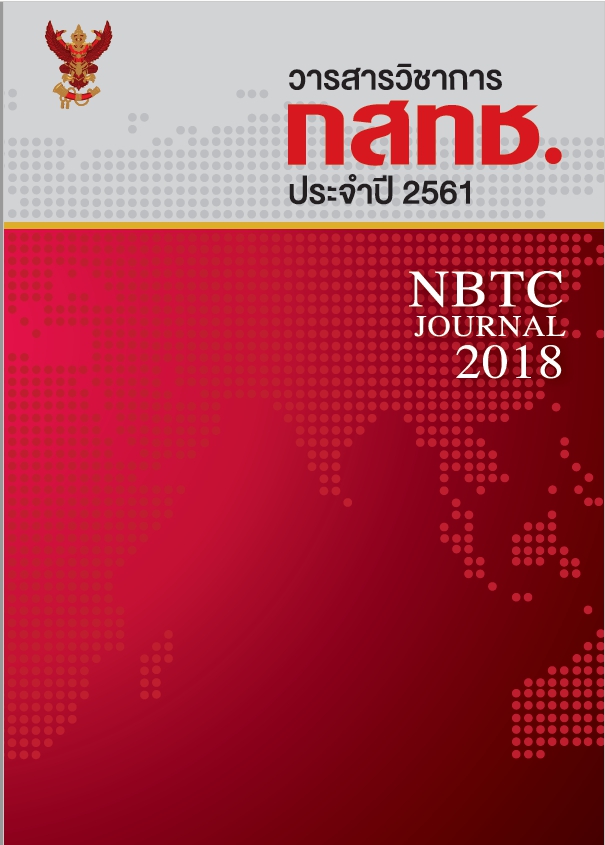Digital Transformation for Thailand 4.0
Main Article Content
Abstract
The 4th Industry Revolution (Industry 4.0) is making radical changes in every industry. Due to technology disruption, organizations can reach customers instantly and with lower costs. It also enables organizations to compete in new business areas as never before.
According to several research institutes, the carelessness of the leader and the overlooked of the executives on the little things without vision could make organizations collapse and disappear from the market quickly. The larger of the organizations that have the longer powerful periods can bring more likely the leader being proud and skeptical how anyone could compete. So that an acceptance of changing is the most important characteristic of good leaders. Strategists often suggest the ways to transform an organization to digital one. In general, most of the successful organizations tend to wisely use of digital technology by directing organizational change effectively.
However, most organizations have not yet set a strategic planning for transition to digital that will lead clearly to a digital success. In this research, managing and benefiting from digital transformations of traditional organizations are studied. It explains the elements of digital transformations in the successful cases and how to evaluate the digital development of the organizations. The researchers try to point out the importance of setting a strategic planning for digital transformation which recommend some principles that leaders and executives can apply to operate in their organizations both business and government sectors.
Article Details
เนื้อหาหรือบทความที่ปรากฏในวารสารวิชาการ กสทช. เป็นลิขสิทธิ์ของสำนักงานคณะกรรมการกิจการกระจายเสียง กิจการโทรทัศน์ และกิจการโทรคมนาคมแห่งชาติ
(สำนักงาน กสทช.) ซึ่งสำนักงาน กสทช. ขอสงวนสิทธิ์มิให้นำเนื้อหา ข้อความ หรือบทความไม่ว่าทั้งหมดหรือส่วนหนึ่งส่วนใดไปเผยแพร่ คัดลอก หรือตีพิมพ์ซ้ำโดยเด็ดขาด
เว้นแต่ได้รับอนุญาตเป็นลายลักษณ์อักษร ทั้งนี้ ข้อความ หรือความคิดเห็นที่ปรากฏในบทความแต่ละเรื่องที่ตีพิมพ์ในวารสารนี้ เป็นความคิดเห็นของผู้เขียน
ไม่ผูกพันต่อคณะกรรมการกิจการกระจายเสียง กิจการโทรทัศน์ และกิจการโทรคมนาคมแห่งชาติ (กสทช.) และสำนักงาน กสทช. รวมทั้งกรณีหากมี
การละเมิดสิทธิ์ถือเป็นความรับผิดชอบของผู้เขียนโดยตรงไม่เกี่ยวข้องกับสำนักงาน กสทช. แต่ประการใด
References
Andriole, S.J., 2017. Five Myths About Digital Transformation. MIT Sloan Management Review, 58(3), pp.20–22.
Beldi, A., Che, W. & Dey, P.K., 2010. Managing customer relationship management projects: The case of a large
French telecommunications company. International Journal of Project Management, 28, pp.339–351.
Berman, S.J., 2012. Digital transformation: Opportunities to create new business models. Strategy & Leadership,
(2), pp.16–24.
Chahal, M., 2016. The True Meaning of Digital Transformation. Marketing Week, (April), pp.16–20.
Clark, C.E. et al., 1997. Building Change-Readiness Capabilities in the IS Organization: Insights from the Bell Atlantic
Experience. MIS Quarterly, 21(4), p.425.
Daimler, P.P., 2017. Will digital boost circular ? Evaluating the impact of the digital transformation on the shift
towards a circular economy. International Journal of Management Cases (January).
Fitzgerald, M. et al., 2013. Embracing Digital Technology: A New Strategic Imperative. MIT Sloan Management
Review, pp.1–12.
Goh, M., Prakash, S. & Yeo, R., 2007. Resource-based approach to IT shared services in a manufacturing firm.
Industrial Management & Data Systems, 107(2), pp.251–270.
Grabski, S.V. & Leech, S.A., 2007. Complementary controls and ERP implementation success. International Journal of
Accounting Information Systems, 8(1), pp.17–39.
Gregor, S. et al., 2006. The transformational dimension in the realization of business value from information
technology. Journal of Strategic Information Systems, 15, pp.249–270
Hess, T. et al., 2016. Options for Formulating a Digital Transformation Strategy. MIS Quarterly Executive, 15(2),
pp.123–139.
Kane, G.C. et al., 2015. Strategy, Not Technology, Drives Digital Transformation. MIT Sloan Management Review,
pp.1–25.
Kaufman, I. & Horton, C., 2015. Digital Transformation: Leveraging Digital Technology with Core Values to Achieve
Sustainable Business Goals. The European Financial Review (December–January), pp.63–67.
Kepes, “Twitter Buys Gnip - It's All About The Data,” Forbes, Apr. 2014.
Krell, T. & Gale, J., 2005. E-business migration: A process model. Journal of Organizational Change Management,
(2), pp.117–131.
Kulatilaka, N. & Venkatraman, N., 2001. Real options in the digital economy. Ebusiness, pp.26–31.
Liu, D.-Y., Chen, S.-W. & Chou, T.-C., 2011. Resource fit in digital transformation: Lessons learned from the CBC
Bank global e-banking project. Management Decision, 49(10), pp.1728–1742.
Matt, C., Hess, T. & Benlian, A., 2014. Digital Transformation Strategies. Business & Information Systems
Engineering, 57(5), pp.339–343.
Raghunathan, M. & Madey, G.R., 1999. A Firm-Level Framework for Planning Electronic Commerce Information
Systems Infrastructure. International Journal of Electronic Commerce, 4(1), pp.121–145.
Schuchmann, D. & Seufert, S., 2015. Corporate Learning in Times of Digital Transformation: A Conceptual
Framework and Service Portfolio for the Learning Function in Banking Organisations. iJAC, 8(1), pp.31–40.
Schwab, K., 2016. The Fourth Industrial Revolution, World Economic Forum.
Schwartz, E.I., 2001. Digital Darwinism: 7 Breakthrough Business Strategies for Surviving in the Cutthroat Web
Economy, New York, NY : Broadway Books.
Sebastian, I.M. et al., 2017. How Big Old Companies Navigate Digital Transformation.
MIS Quarterly Executive, 16(3), pp.197–213.
Singh, A. & Hess, T., 2017. How Chief Digital Officers Promote the Digital Transformation of their Companies. MIS
Quarterly Executive (March), pp.31–44.
Valdez-de-leon, O., Christensen, C. & Valdez-de-leon, O., 2016. A Digital Maturity Model for Telecommunications
Service Providers. Technology Innovation Management Review, 6(8), pp.19–32.
Venkatraman, N., 1994. It-Enabled Business Transformation - From Automation To Business Scope Redefinition.
Sloan Management Review, 35(2), pp.73–87.
Von Leipzig, T. et al., 2017. Initialising customer-orientated digital transformation in enterprises. Procedia
Manufacturing, 8(2017), pp.517–524.
Ward, J., Griffiths, P. & Whitmore, P., 1990. Strategic Planning for Information Systems. Chichester: Wiley.
Webb, N., 2013. Vodafone puts mobility at the heart of business strategy. Human Resource Management
International Digest, 21(1), pp.5–8.
Westerman, G., Bonnet, D. & Mcafee, A., 2014. The Nine Elements of Digital Transformation. MIT Sloan
Management Review, January, pp.1–6.
World Economic Forum, “Digital Transformation of Industries: In collaboration with Accenture,” World Economic
Forum White Paper, Digital Enterprise, January 2016.
Yoo, Y., Henfridsson, O. & Lyytinen, K., 2010. Research Commentary - The New Organizing Logic of Digital
Innovation: An Agenda for Information Systems Research. Information Systems Research, 21(4), pp.724–735.
Zhao, J., Vincent Huang, W. & Zhu, Z., 2008. An empirical study of E-business implementation process in China.
IEEE Transactions on Engineering Management, 55(1), pp.134–147.

